Master of ArtsArt Therapy and CounselingCollege of Arts and Sciences
The therapeutic world of art
Art Therapy is a mental health and wellness profession that centers on participation in art making as a primary function of holistic assessment, mediation, and renewal. Art Therapy provides the ability to review life events, and examine relationships to resolve conflicts, heal trauma, and create new life narratives and growth.
Clinical Mental Health Counseling is a mental health and wellness profession that addresses emotional issues, coping and communication skills, improvement of self-esteem, and promotion of changes in behavior while striving for improved mental and emotional well-being. Clinical Mental Health Counseling provides evaluation, support in establishing goals, development and implementation of evidence-based and evidence-informed counseling treatment approaches, advocacy and follow-up with clients.
The program will train art therapists and clinical mental health counselors who will apply their knowledge, human relationship skills, and passion for art to mobilize the creative process inherent in each person to promote change, growth, and well-being in individuals, families, and communities.
Global
Hybrid
60
Program Highlights
- 2-year program (60 credits) with flexible time options to degree completion
- Fully online coursework, with access to state-of-the-art studio facilities for students in Madison, WI
- Students are required to attend two in-person residencies in Madison, WI. These are offered in August and April.
- Interactive, cohort-based teaching environment with small class sizes (8 students per class)
- Unique curriculum teaches how to use art making to achieve therapeutic goals
- Access to guest art therapists/mental health counselors
- Guaranteed access to residency and clinical placements near your home
Careers in Art Therapy
$63,048
Average annual salary for an Art Therapist*
A master’s degree in art therapy prepares you for a variety of career paths.
- Art Therapist
- Occupational Therapist
- Special Education Teacher
- Speech Language Pathologist
- Substance Abuse, Behavioral Disorder, and Mental Health Counselors
**Stats about your major can include numbers such as how many partners/clinical sites/internship sites you have, student:faculty ratio, class size, retention rate, graduation rate, job placement, how many students attended graduate school post-graduation in the last two years, the number of community partners, the number of research hours or projects students will complete this year, the combined years of work experience of faculty in the department, how many graduates in the program, how many students will present their research this year, etc.
Featured Courses in Art Therapy
Explores multiple perspectives of emotional and psychological distress including cultural factors, strengths, and resilience and correlates patterns of abnormal behavior and psychopathology along with symptomology, etiology, and overall use of the DSM-5 and ICD-11 for assessment and diagnostic purposes across the lifespan including evidence-based treatment approaches related to various diagnostic categories.
ARTTH 634 – Community/Mental Health in Context
Emphasizes the dynamics of mental health practice in context incorporating art therapy, counseling and psychological theories, case conceptualization, processes of assessment including intake, mental status evaluation, biopsychosocial history, formal and informal assessment processes. Diagnostic criteria and differential diagnoses based upon the current DSM and ICD are covered as well as goal setting, treatment planning, and referral procedures.
Explores basic theoretical concepts in Family Systems Theory including historical and conceptual evolution of the field. It comprises an introduction to General Systems Theory; family rules, roles, structure and interaction patterns; functional and dysfunctional family systems; cultural considerations, and the life cycle in marriage and family including assessment and treatment applications of art therapy and counseling.
Edgewood University Art Therapy Student Experience
The Edgewood University Master’s in Art Therapy and Counseling program holds cultivation of the practice of artist-making as central to the art therapist identity. This hybrid program is primarily taught online, but also includes two required on-campus residencies that give students the opportunity to connect in person with faculty and peers.
During residences and throughout your studies, students have access to The Stream, Edgewood University’s art center, which features state-of-the-art studios in drawing, painting, printmaking, ceramics, sculpture, photography, and graphic design. The Stream is also home to a professional gallery, student and community gallery, and theater, making it a hub of a thriving artistic community with gallery openings, artist talks, panels, and visiting artists.
The art therapy and counseling program also offers dedicated studio classroom and learning lab space designed for teaching and hosting workshops with community participants. Students may take a graduate art studio elective as part of their degree and may access the art studios if they choose to audit additional studio courses.
Faculty Spotlights
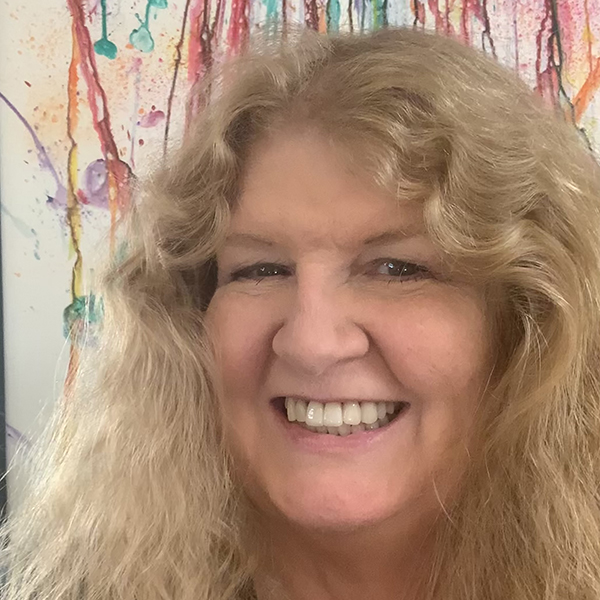
Jill McNutt
Director of the Master of Art Therapy Program
JMcNutt@edgewood.edu
Post-Masters Certificate
Art Therapy is a mental health and wellness profession that centers on participation in art making as a primary function of holistic assessment, mediation, and renewal. Art Therapy provides the ability to review life events, and examine relationships to resolve conflicts, heal trauma, and create new life narratives and growth.
The program will train art therapists who will apply their knowledge, human relationship skills, and passion for art to mobilize the creative process inherent in each person to promote change, growth, and well-being in individuals, families, and communities.
Upon completion of the program you will earn a Certificate of Completion in Art Therapy that aligns with the Art Therapy Credentials Board’s coursework requirements to obtain credentials as an art therapist.
Immediately following the program, you will be eligible to apply for a provisional art therapy registration (ATR-P). Following post-graduate training hours and post-graduate examinations, you will be eligible for the art therapy registration (ATR-BC). This certificate specifically provides graduates with expertise in working in art therapy with a variety of clients across a variety of settings and conditions. This training also provides excellent preparation for clinical, administrative, and leadership work within social and human rights agencies.
The Art Therapy Post-Masters Certificate program is supported by Edgewood University’s heritage of integrating learning, beliefs and action with core values of Truth, Compassion, Community, Partnership, and Justice. We aspire to train licensed mental health professionals in art therapy so that they can apply their knowledge, human relationship skills, and passion for art and service to mobilize the creative process inherent in each person to promote change, growth, and well-being in individuals, families and communities.
The Art Therapy Post-Masters Certificate program is a 39 to 45-credit program of study. Included in the program are 700 hours of clinical practicum and internship working across a variety of settings with a range of populations. During practicum and internship courses, students will receive weekly supervision from an approved on-site supervisor, and attend supervision groups with a qualified art therapy supervisor.
Students with master’s level mental health licenses eligible for the certificate program are also eligible to earn a second master’s degree by entering the Masters of Arts in Art Therapy program.
The program is oriented around excellence in art therapy in such a way as to infuse an authentic art therapist identity. We hold art psychotherapy, art as therapy, and art in therapy as complementary and intertwined and provide a cohesive and fundamental learning environment where art therapy practices can be mastered.
The program uses a cohort model and requires a minimum of two years for completion. The coursework is rigorous and the two-year option will require focus and tenacity.
The program is flexible and will allow for courses to be taken at a slower pace. The courses have been intentionally developed for virtual online delivery with a combination of synchronous and asynchronous learning experiences to allow for flexibility in teaching, learning and scheduling at field placement sites. Several courses involve art-making and will offer optional in-person attendance in the Stream art building. Each year, the Art of Art Therapy: Techniques of Practice will bring cohorts together for a residency program with a guest art therapist for weekend intensive experiences of learning about a specialty area of practice with art-making and discussion. Students are required to attend at least one residency per year.
- Provide evidence of a master’s degree in a counseling or counseling related field.
- Eligible to practice as a master’s level licensed mental health provider.
- Official transcripts reflecting completion of a baccalaureate or more advanced degree from a United States accredited or equivalent post-secondary institution with a cumulative grade point average of at least a 3.0 on a 4.0 scale for regular admission status. The cumulative grade point average is computed on the highest degree held at the time of application to the Edgewood University graduate program.
- Request the official transcripts for all undergraduate and graduate academic credits received from any post-secondary institutions to be sent directly to Edgewood University Graduate and Professional Studies.
- Pre-requisite courses include:
- 18 credits in studio arts in both two and three-dimensional media. (12 credits must be completed before admittance; up to 6 credits can be completed during the first year of study). Preferred courses:
- Drawing
- Painting
- Sculpture
- Ceramics
- Photography
- Digital Arts
- b. 6 credits in psychology or closely related fields. Required courses:
- Developmental Psychology through the Lifespan
- Abnormal Psychology or Psychopathology
- 18 credits in studio arts in both two and three-dimensional media. (12 credits must be completed before admittance; up to 6 credits can be completed during the first year of study). Preferred courses:
- Complete and submit graduate application.
- The names and email addresses of three professional references will be listed on the Graduate Art Therapy Application. One of these references must be an educator, one of these references must be familiar with work or volunteer history, and the third can be from any character reference who is not immediate family.
- A 300 – 500-word essay in APA style indicating motivations and professional goals for pursuing a graduate degree in art therapy. The written statement should include:
- Interests and motivations for wanting to become and art therapist
- Ability to succeed in graduate school
- What life, education, and/or work experiences have prepared you in providing basic human service.
- Professional Resume
- Documentation of 100 hours of work or volunteer hours in a human service venue.
- Art Portfolio demonstrating both two and three-dimensional works. A video presentation explaining engagement with the media is preferred.
- An interview is required for admittance. The interview can take place at anytime during the application process. Interviews can be in person and include a tour of campus (preferred); or virtually.
The Art Therapy Post-Masters Certificate program begins in fall (August) of each academic year. It is a highly-competitive cohort-based program with rolling admissions opening October 15th for the next year’s Fall cohort. Applicants are strongly advised to apply early as applications are reviewed and spots are filled throughout the year.
Currently, there is one start for the certificate program annually in Fall. As the program develops, a second start in Spring will be considered.
Related Programs
-
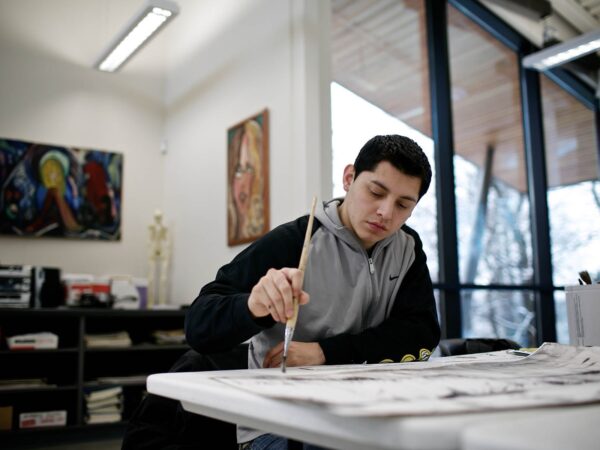
-
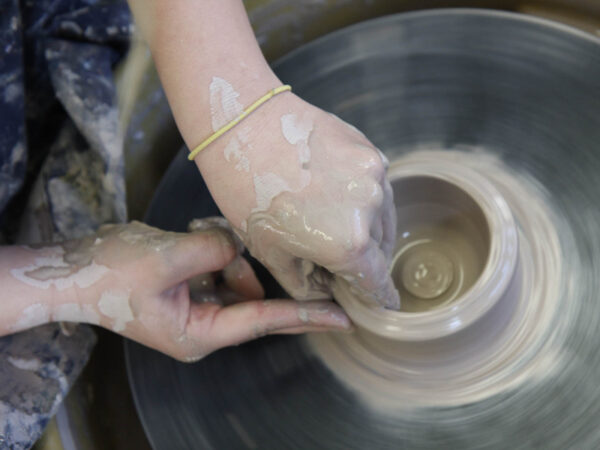
On-campus
Bachelor of Arts in Art Therapy -
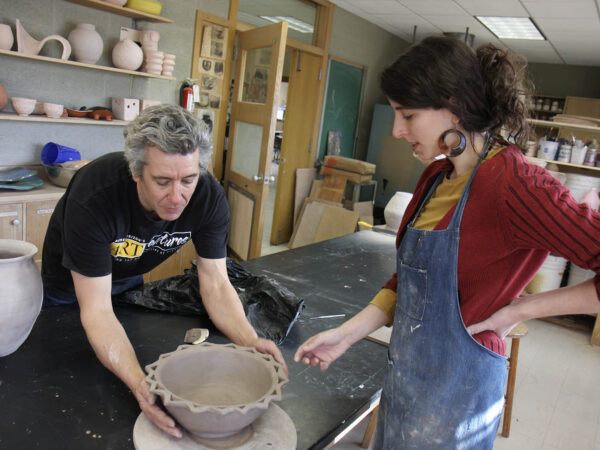
On-campus
Bachelor of Arts in Art
-
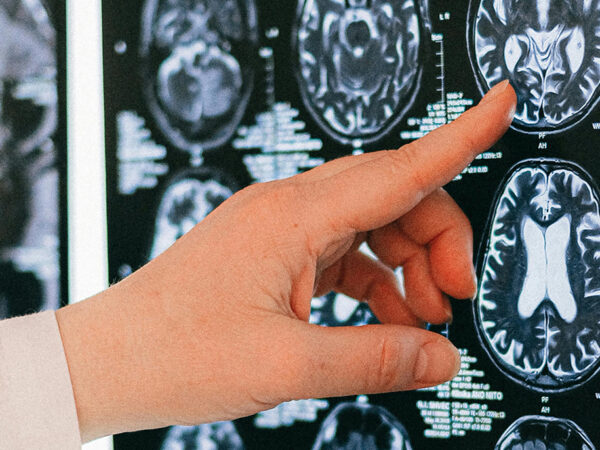
On-campus
Bachelor of Science in Neuroscience -
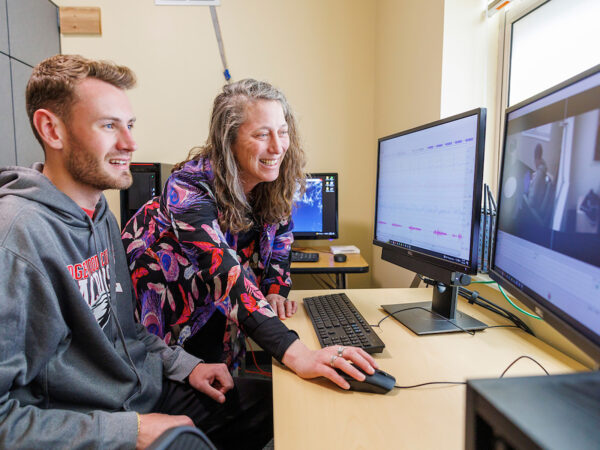
On-campus
Bachelor of Science in Psychology -
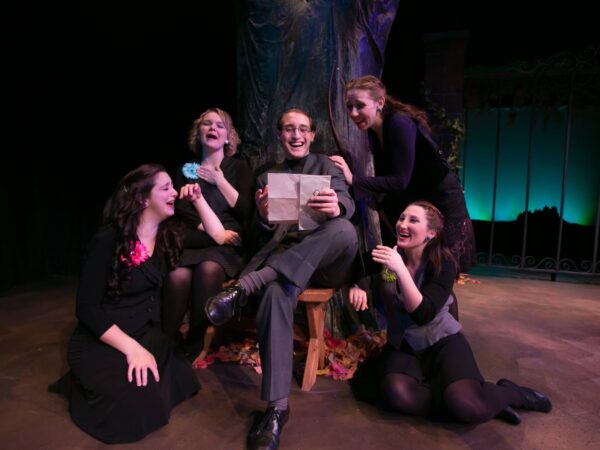
On-campus
Bachelor of Arts in Theatre Arts
Frequently Asked Questions About Art Therapy
Where do Art Therapists find work?
Art therapists with a master’s degree often find employment in various settings such as community centers, senior centers, retirement facilities, educational institutions, after-school programs, and through hospital artist residencies.
What are the program goals for Master’s in Art Therapy and Counseling program?
The goals of the Master of Arts in Art Therapy and Counseling program aim to foster student students’ professional development through education on up-to-date history, theory and techniques that facilitate culturally and trauma informed practices within art therapy and clinical mental health counseling enhanced by the use of creativity and art making for psychological, emotional, and spiritual health. The program aims:
- To provide instruction, experience, and resources for students according to the educational guidelines for art therapy education programs through the Commission on Accreditation of Allied Health Education Programs (CAAHEP) and clinical mental health counseling education programs through the Council for Accreditation of Counseling and Related Educational Programs (CACREP).
- To prepare competent entry level Counselors and Art Therapists in the cognitive (knowledge), psychomotor (skills), and affective (behavior) learning domains.
- To nurture students’ capacity to integrate theories and practices of art therapy and clinical mental health counseling within the therapeutic self for meaningful professional work within diverse settings in an equitable and inclusive manner.
- To foster students’ repertoire of evidence-based art therapy and clinical mental health counseling skills to enhance clinical competencies and a commitment toward continuing education.
- To enhance community and independent learning, critical thinking skills, and the ability for students to integrate both art therapist and clinical mental health counselor identities in service and in leadership.
- To foster a community of learning and mutual support in both in-person residencies and blended online courses to support students’ pursuit of purposeful lives including self-care, contributions to vibrant and sustainable communities, and advocacy to support justice in our world.
What are the program outcomes for the Master’s in Art Therapy and Counseling program?
Students will:
- Analyze the historical and theoretical components of Art Therapy and Clinical Mental Health Counseling as individual professions, and subsequently create and embody the professional identities of Artist/Art Therapist and Clinical Mental Health Counselor in such a way as to nurture and maintain personal health and well-being, and apply them as a foundation for contemporary Art Therapy and Clinical Mental Health Counseling professional practice.
- Exhibit skills in clinical interviewing, recognition of body language and behaviors, distinguishing therapeutic benefits of a variety of art processes and media applicability, and development of productive therapeutic relationships in order to respond to clients in an appropriate client centered manner in individual, group, and family formats.
- Apply responsive practices of multicultural perspective, based upon a continuously- informed understanding of cultural and social issues with recognition of the impact of oppression, prejudice, discrimination, and privilege on access to mental health care along with adherence to federal and state laws and professional ethics, to the practice of Art Therapy and Clinical Mental Health Counseling.
- Responsive practices include, understanding professional roles and responsibilities and their relationship to involvement, advocacy and collaboration both within and among professional and community organizations in regard to, empowerment, advocacy, and social justice.
- Ethical responsibility includes the ability to recognize and respond appropriately to ethical and legal dilemmas using ethical decision-making models, supervision, and professional and legal consultation when necessary.
- Implement the basic diagnostic process using culturally and developmentally appropriate methods and resources incorporating the evaluation of creativity, symbolism and metaphor along with lifestyle choices to recognize communication challenges, strengths and promotion of growth and well-being as related to major categories and criteria of mental disorders, corresponding treatments, and commonly implemented clinical responses including pharmacology and referral networks.
- Incorporate principles of human development, artistic and creative development, human sexuality, lifestyle and career development, gender identity development, family life cycle, ability, and psychopathology, toward the assessment and treatment of clients across a variety of conditions including, mental health and wellness, life transitions, trauma and violence, and substance use and abuse treatment within mental health and medical treatment centers, schools, wellness and neighborhood centers, correctional facilities, veterans and community agencies, and non-profit settings.
- Critically evaluate and apply evidence-based practice including research, client centered treatment, and clinical expertise utilizing best practices, continuing education, clinical supervision, and implementation of research within ethical and cultural considerations to inform clinical practice and advancement of the fields of art therapy and counseling.
What are the residency requirements for this program?
The graduate art therapy and counseling program will host two residencies each year. The first (August) will precede fall courses and the second (April) will follow spring courses. Residencies are scheduled Thursday evenings through Sunday afternoon. Both residencies are highly recommended. Students are required to attend at least one residency per year.
Will students enrolled in this program have any clinical placements?
Within the Graduate Art Therapy and Counseling Program, three clinical placements are required. Practicum is the first clinical experience where students spend at least 100 hours on-site with a registered art therapist and licensed counselor. A minimum of 50 hours must be in direct contact with clients. Practicum sites and supervisors are contracted, trained, and approved by the Clinical Coordinator.
Two Internships are required for completion of the graduate art therapy and counseling program. Each internship requires 300 hours of which 150 direct client contact is required. Clinical sites and supervisors are contracted, trained, and approved by the Clinical Coordinator.
How can I help people with art therapy?
Art therapy is often used with people with mental health conditions, such as anxiety or depression. However, it can also be helpful for people who are dealing with physical health conditions or life transitions. It helps people cope with difficult situations, process emotions healthily, and gain insight into their thoughts and feelings. It’s also a fun and creative way to explore new ideas and express yourself.
Can I transfer credits from a different institution towards this program?
You may submit up to 15 semester credit hours of graduate credit for consideration to transfer to Edgewood University for applications to a degree program. Approval of the respective department is required. To be considered for application to a degree program, a course must have been taken within the past five years. For more information about transfer credits, please contact your admissions counselor.
Does this program require a background check?
All Graduate Art Therapy Students must comply with the State of Wisconsin requirement for a Criminal Record Background Check. Students must have had this check successfully completed by the end of the first semester to be allowed to continue in the program.
What is the maximum credit load per semester for this program?
Full-time students in the Graduate Art Therapy Program may carry up to 15 credits per semester. Some of the courses are taught in 8-week sessions, and some are taught in 16-week formats. Students may not be active in more than three courses at any time unless a waiver has been granted by the student’s advisor.
Students may work with advisors to establish a longer trajectory. The program must be completed within seven years of start date.